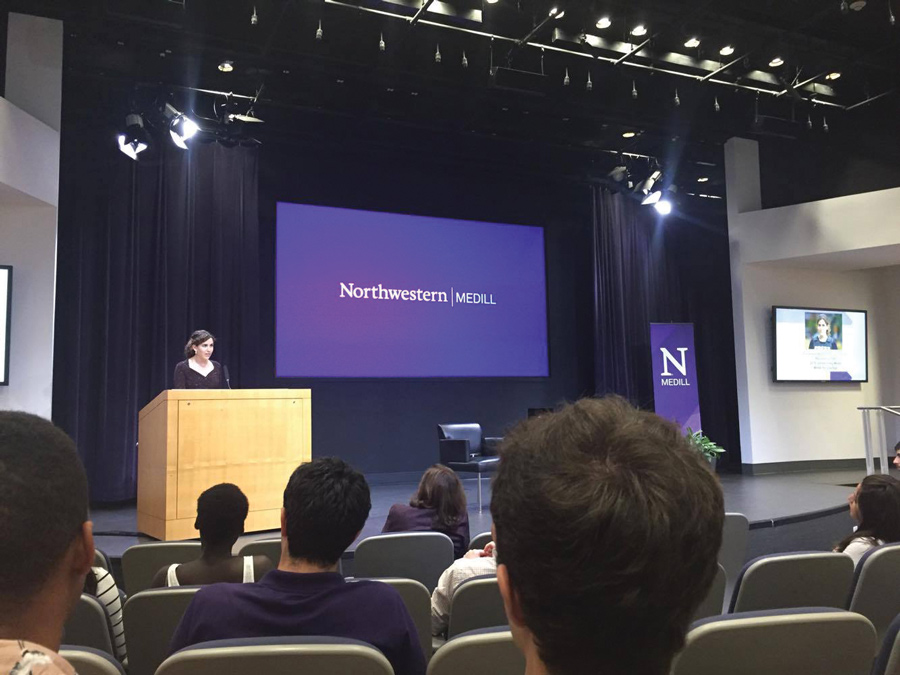Associated Press reporter wins Medill award for reporting in Venezuela
Gerardo Alvarez/The Daily Northwestern
Hannah Dreier speaks to NU students in the McCormick Foundation Center Forum. Dreier received the 2016 James Foley Medill Medal for Courage in Journalism on Friday.
September 25, 2017
More than 170 Northwestern students and faculty gathered Friday to celebrate former Associated Press correspondent Hannah Dreier for her reporting in Venezuela.
Dreier accepted the 2016 James Foley Medill Medal for Courage in Journalism at the event, which was held at the McCormick Foundation Center Forum. A panel of three Medill professors selected Dreier to receive the award, which is given to journalists who have demonstrated remarkable “moral, ethical, or physical courage” in their coverage of a major story, according to a Medill website.
In 2014, the award’s name was changed to honor James Foley (Medill ’08), a freelance journalist who was killed after being captured in Syria in 2012.
Dreier received the award for her reporting in Venezuela, where she said she resided for three years as AP’s correspondent before moving back to the U.S. this past June. Dreier said she was interrogated and intimidated by undercover police, and later gave a false confession.
Medill Prof. Donna Leff, one of the panelists, told The Daily that Dreier received the award for covering the unexpected political instability and rising crime rate in the country only months after she had moved there.
“All of a sudden, the whole place just fell apart, which was crazy considering how rich the country was in the past,” she told The Daily. “So she just stumbled into this place and then knew exactly what she was going to do with it.”
While she was in Venezuela, Dreier said doctors were held at gunpoint by patients who suspected that hospital resources were withheld. Teachers stopped showing up to school, fearing violence, as their students were regularly held at knifepoint, she said.
There were times when it became dangerous to report her articles, Dreier said. She recounted the story of a family who resided in a remote fishing village and feared a pirate attack that would leave them without fishing boat motors.
“I was in this fishing village with an AP photographer, and we watched some members of this family smoke crack from a long glass pipe and then assemble their arsenal of guns,” she said. “They made a plan to jump into the ocean and swim to safety if a shootout started. I was so wrapped up in drama that night that I forgot I don’t actually know how to swim.”
Dreier said Venezuela was a dangerous place for journalists. She said the government repressed and censored journalists who tried to expose corruption.
In addition, Dreier said, the government neglected the violence in the country, and the only events shown in the media were pro-government.
“One day I saw President Maduro dance salsa live on TV while outside my window there were police in riot gear shooting tear gas canisters and putting down protests,” she said.
Dreier said most journalists will face situations that are unexpected and unpredictable. Despite the risk of danger, she said it is important for reporters to take on the responsibility of covering “high-stake” events.
Medill graduate student Robbie Weinstein told The Daily he was moved by Dreier’s words and took her speech to heart.
“I knew there was something going on down there but I didn’t know the exact scope of it,” Weinstein said. “And so to hear all of these specific anecdotes was really quite moving and very powerful.”
Email: gerardoalvarez2018@u.northwestern.edu
Twitter: @gerardoa_7



